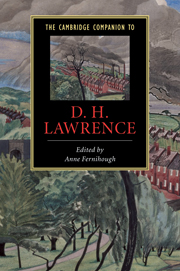Book contents
- Frontmatter
- Introduction
- Part 1 Texts
- 1 Ideas, histories, generations and beliefs: the early novels to Sons and Lovers
- 2 Narrating sexuality: The Rainbow
- 3 Sex and the nation: ‘The Prussian Officer’ and Women in Love
- 4 Decolonising imagination: Lawrence in the 1920s
- 5 Work and selfhood in Lady Chatterley’s Lover
- 6 Lawrence’s tales
- 7 Lawrence’s poetry
- 8 Lawrence as dramatist
- Part 2 Contexts and critical issues
- Guide to further reading
- Index
1 - Ideas, histories, generations and beliefs: the early novels to Sons and Lovers
from Part 1 - Texts
Published online by Cambridge University Press: 28 May 2006
- Frontmatter
- Introduction
- Part 1 Texts
- 1 Ideas, histories, generations and beliefs: the early novels to Sons and Lovers
- 2 Narrating sexuality: The Rainbow
- 3 Sex and the nation: ‘The Prussian Officer’ and Women in Love
- 4 Decolonising imagination: Lawrence in the 1920s
- 5 Work and selfhood in Lady Chatterley’s Lover
- 6 Lawrence’s tales
- 7 Lawrence’s poetry
- 8 Lawrence as dramatist
- Part 2 Contexts and critical issues
- Guide to further reading
- Index
Summary
The puzzle of the early work: The White Peacock
What gave Lawrence's work its distinctive character in the second decade of the twentieth century? Reviewers of the first three novels appeared perplexed. There was confusion about the author's social milieu and gender, and irritation that provincial fiction should be so learned in literary and intellectual allusion. His characters moved unpredictably between 'public-houses and dinner parties' and had deplorable grooming rituals: 'among their habits is a trick of messing and caressing and stroking each other's hair or arms'.This zoological sneer loped after Lawrence throughout his career. Behind it lurked worries about evolutionary descent from the apes and, more worrying still, the possibility of degenerate reversion. But amid fretfulness about his carelessness with social and literary form, and his shocking lack of sexual reticence (a charge that began with The Trespasser in 1912), the central issue was bewilderment about his meaning. Few denied his talent; fewer still had a collected sense of where it led:
what does our author really mean by these pictures of wasted lives and illmatched marriages? Is he a new prophet of the old fallacy of ‘returning to Nature’? It sometimes looks like it, and yet the apologue which explains the title of The White Peacock does not suggest this as a moral, for surely the game-keeper who reverted violently ‘to Nature’ after freeing himself from his unnatural wife, ‘the white peacock’, did not make much of his experiment.
- Type
- Chapter
- Information
- The Cambridge Companion to D. H. Lawrence , pp. 15 - 32Publisher: Cambridge University PressPrint publication year: 2001
- 2
- Cited by



